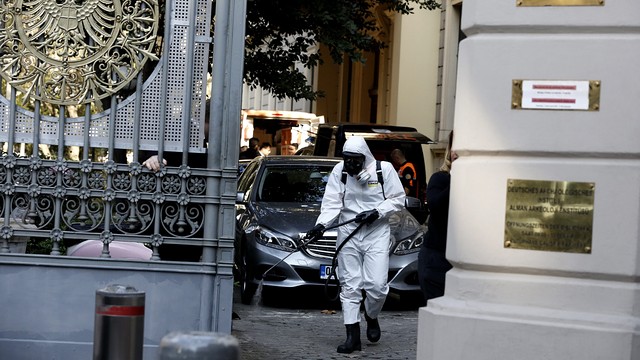On June 23, 2016, the people of the United Kingdom voted to leave the European Union in a national referendum put forth by former Prime Minister David Cameron. The event, often referred to as “Brexit,” is the first of its kind: no other EU member state has chosen to invoke article 50, which outlines the legal framework to exit the union. Although the Britain is not expected to formally leave the EU until 2019, the international community continues to speculate about the ramifications of such departure.
Most often, the media puts a spotlight on the economic consequences of Brexit. This is not surprising, as the EU constitutes the world’s most comprehensive free-trade agreement. Opponents of Brexit often appeal to the benefits that the free-trade opportunities within the union yields, as Brexit could result in the imposition of potentially disadvantageous tariffs and trade regulations from the EU. Other key issues that the British government highlighted in a post-Brexit report are immigration control, their future relationship with the EU, and the reinforcement of domestic laws within Britain.
However, it is also critical to consider whether or not Brexit will alter Britain’s foreign policy model. If so, what kind of foreign policy will Britain pursue towards one of its main allies, the United States, and the international organizations it belongs to? After leaving the obligations and beneficiaries that a union membership brings along, it is arguably more essential than ever for Britain consider how to best pursue its foreign affairs objectives. This may even provide Britain with an opportunity to reshape its foreign policy layout, as it is no longer bound by common guidelines stipulated by the union.
Leaving the EU will surely be long procedure, as it will require rigorous negotiations in the EU parliament to determine the conditions of Brexit. Since Britain is no longer able to use the EU as a platform to advance its foreign policy objectives, they may decide to focus on cultivating multinational partnerships, such as the NATO alliance and the UN Security Council. Britain is one of the handful of NATO members who met the alliance’s defense spending target: 2% of GDP. It proves that Britain is already in a good position to continue exercising its influence within NATO. Moreover, Britain occupies one of the permanent representative seats in the UN Security Council, which also provides a unique opportunity to leverage foreign policy goals.
On one hand, it makes sense to consolide relations with other institutional commitments, as it will allow Britain to influence global decision making processes. On the other hand, there are some world leaders promoting a foreign policy model focusing on protecting state borders, rather than seeking to engage in global multilateralism. The alliance-skeptic Trump administration in the U.S and Marine Le Pen’s nationalistic presidential campaign in France are two examples. Such developments are, to some extent, proving that the prevailing global governance structures are eroding. Whether Britain will pursue a foreign policy model based on isolationism or internationalism remains to be seen. One could argue that Brexit is itself a manifestation of continental isolation, as British people voted to leave the EU. Prime minister Theresa May has explicitly articulated that Britain will “take back control” of its border, which does not necessarily entail a wish to isolate the country, but does not speak in favour of internationalism either. Even so, the British government has not expressed any motives to disembark from their current international partnership forums, which can hopefully appease Brits who are advocates of internationalism.
The United States has long been one of Britain’s primary allies. The U.S. President Donald Trump announced during the British Prime Minister’s visit to Washington in January 2017 that Brexit will be a “wonderful thing.” Although Trump seemed rather positive about the Brexit referendum outcome, the leaders of the two countries do not agree on a number of critical foreign policy matters. For example, Trump is not as prone as May to maintain the sanctions on Russia that were imposed after the Crimea annexation. Moreover, during his campaign, Trump openly questioned the usefulness of NATO, while May herself attempted to reaffirm the U.S. president’s commitment to the alliance by referring to NATO as the “bulwark of our collective defence.”
It is possible that Britain’s foreign policy approach towards the U.S. will likely be shaped by Trump’s leadership style rather than Brexit. Cozying up with the U.S. could solidify Britain’s relation to a strong ally after having abandoned their EU membership, yet the incompatibilities between Trump and May’s presidency might prevent this from taking place. Theresa May was publicly pressured to express her discontent with Trump’s controversial travel ban, as she was initially hesitant to condemn it. Her cautious means of addressing Trump’s policies is facing opposition from both British politicians and members of the public, who have been employing a more antagonistic tone towards Trump. Thus, it is interesting to observe how Britain tailors its foreign policy model with regards to the United States: will it be denoted by a conscious and careful approach or inclined towards being confrontational?
Brexit has caused quite a stir domestically and within the rest of Europe. It is not likely that Britain would seek to pursue a foreign policy model that would further jeopardize any global stability. It is much more likely for Britain to sustain its commitment to existing alliances and partnership forums, such as the international coalition against ISIS, sanctions on Russia and the Paris Climate Agreement. These commitments, among with many others, are likely to remain integral to Britain and therefore continue to shape is foreign policy style. A change that might occur is that Britain becomes more aggressive to promote its foreign policy objectives in the U.N Security Council and NATO. Although they cannot compensate for the free-trade aspects that the EU provides, the two organizations represent important platforms for global decision making procedures. Despite certain conflicting views with the Trump administration, Britain may find ways to work alongside the U.S. to avoid alienating their powerful ally.
Photo: “Move for Europe demonstration, London, 23 July, 2016 02” (2016), by Jwslubbock via Wikimedia Commons. Licensed under CC BY-SA 4.0.
Disclaimer: Any views or opinions expressed in articles are solely those of the authors and do not necessarily represent the views of the NATO Association of Canada.




